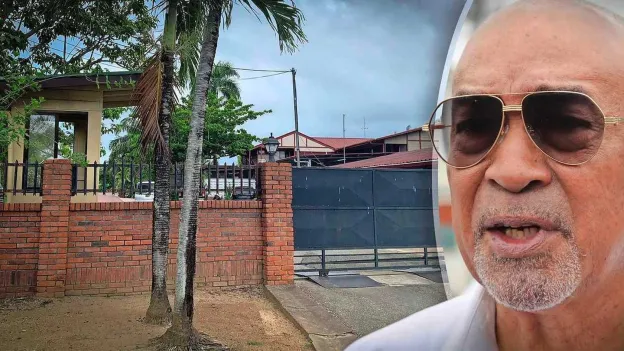
'Silent agreement with Surinamese government: Bouterse (79) allowed to say goodbye and die in his own villa'

paramaribo - Read the reconstruction of the death of Desi Bouterse on Telegraaf.nl: 'Silent agreement between Bouterse and Surinamese government'
Desi Bouterse, the former president (79), recently decided to give up his exhausting flight from justice. However, he did not want to face the humiliation of an arrest, or the prospect of imprisonment in Santo Boma penitentiary in his remaining time. Bouterse wanted to die peacefully.
There was feverish secret negotiations as his plea presented a devilish dilemma to the government. While most of society would never accept such a cunning deal, Bouterse's death brought calm after a brief storm. In short, the government was willing to make the 'death agreement'. The audacious request was discussed at the highest level.
On Tuesday evening, a black car arrived at the estate on Patrijsstraat, a former coffee plantation. The official explanation later claimed that Bouterse's body was inside, but sources tell De Telegraaf that the former president was not in the car. He was inside, alive but very ill.
Bouterse spent his last days at his retreat in Broko Baka, in Nickerie, according to a Surinamese source. He had prepared for a violent confrontation with the police if found there, with a significant arsenal of weapons, including five AK-47s and handguns. His assets, including gold and cash totaling $100,000, have since been removed.
Earlier, he had a weapons room in Leonsberg. His grandson, Walter, managed to access it in 2021 and committed suicide with a handgun at the age of 26.
In Nickerie, one of the most remote regions of Suriname, Bouterse was first moved to a house belonging to a devoted follower. Two days before his death, unknown individuals took him to his residence in Leonsberg, according to a contact within the Surinamese police force. Following a complex operation, Bouterse and his wife Ingrid spent their final moments together.
From eleven o'clock on Tuesday night, the ex-president's health rapidly deteriorated, sparking rumors of Bouterse's death. Local journalists rushed to his mansion and broadcast live reports as crowds gathered outside, prompting authorities to redirect them to a different location.
An intriguing figure, Melvin Linscheer, a former close associate of Bouterse known as the 'butcher of the interior', was present at the house. Under Bouterse, he headed the intelligence service and was linked to the Surinamese drug cartel. Now, he serves as the highest security advisor to President Santokhi, ideally positioned to manage the sensitive agreement.
Familiar faces entered the Patrijsstraat residence and were instructed to turn off their phones. Family members, including some grandchildren, arrived around three o'clock. They saw a bald, gray-bearded Bouterse, a far cry from the once-mighty military leader.
His transformation from a powerful figure to a frail old man is evident in a photo obtained by De Telegraaf, showing him peacefully laid out, shortly after passing away.
An 'indigenous man' alerted the police to Bouterse's death. Subsequently, a message came in that a body had been 'delivered' to the house, initially reported at 05:11 AM but later adjusted to over an hour later.
Forensic pathologist Rabindernath Khoenkhoen, along with Bouterses's physician, Humphrey Hasrat, arrived on site at 06:38 AM and confirmed his passing at 06:50 AM. An insider indicated that his death was indeed planned. Allegedly, he was put to sleep due to his severe illness.
As per Laurens Neede, a childhood friend, Bouterse chose to exit the world himself. The Public Prosecutor's Office announced Bouterse's death on Saturday, citing liver failure complications as the cause, likely occurring on December 23 or 24. His heavy drinking in recent years contributed to his health issues.
A meticulously planned press conference was given at the Ministry of Foreign Affairs, International Business, and International Cooperation, adjacent to the Anti-Corruption Commission building, with tight control over the proceedings. Ministers evaded inquiries about the government's covert activities, carefully choosing their words.
Despite Minister Amoksi's slip, hinting at a prior agreement, officials remained tight-lipped on other questions regarding government involvement. The mystery surrounding the state's concealed actions added to the intrigue surrounding Bouterse's final days.
While official statements suggest an investigation into Bouterse's whereabouts, convicted for his role in the December Murders and seeking accomplices, Minister Amoksi refrained from divulging further details. The veil of secrecy over the operation surrounding Bouterse's demise remains largely intact.
Days before his passing, police raids were conducted at four of his hideouts, but Bouterse had already vacated them. Allegedly, he frequented these locations, notably in Leonsberg and Broko Baka, spending his final days in Suriname.
Prior to this period, witnesses had spotted him in Venezuela and Cuba, seeking medical treatment for kidney issues.
Following the autopsy conducted by the Public Prosecutor's Office and the confiscation of his body, the villa in Leonsberg fell quiet. Various vehicles, including a Toyota Tundra, an Audi, and a red trike, remained parked on the vast premises, guarded to prevent unauthorized access.
Suriname remains enveloped in tension, as the repercussions of Bouterse's orchestrated demise continue to reverberate within the nation.


Leave a comment